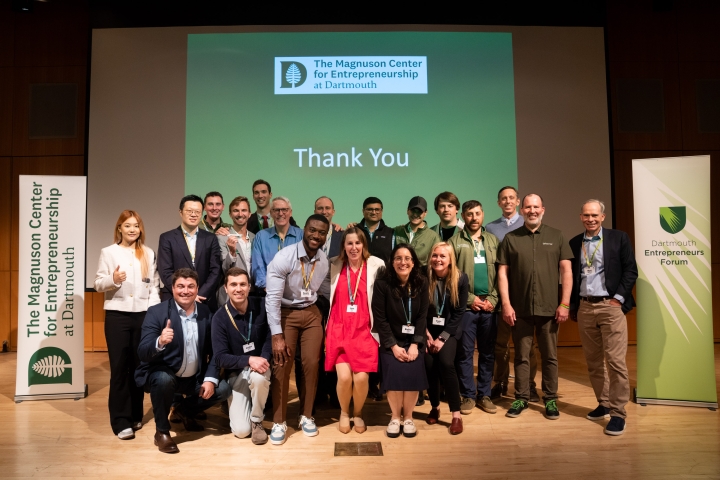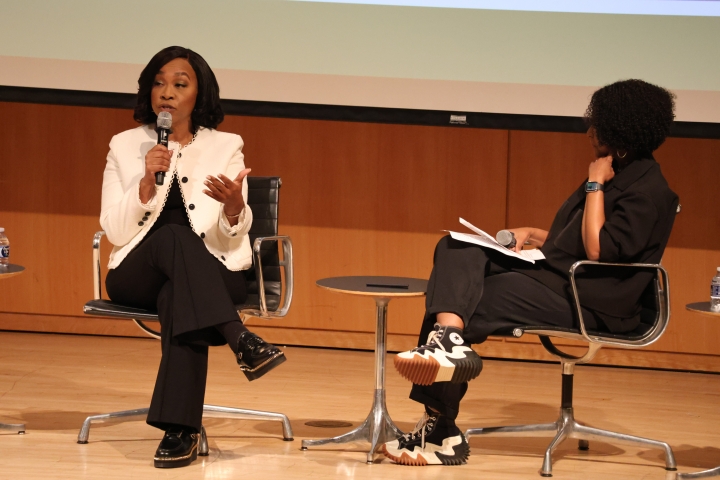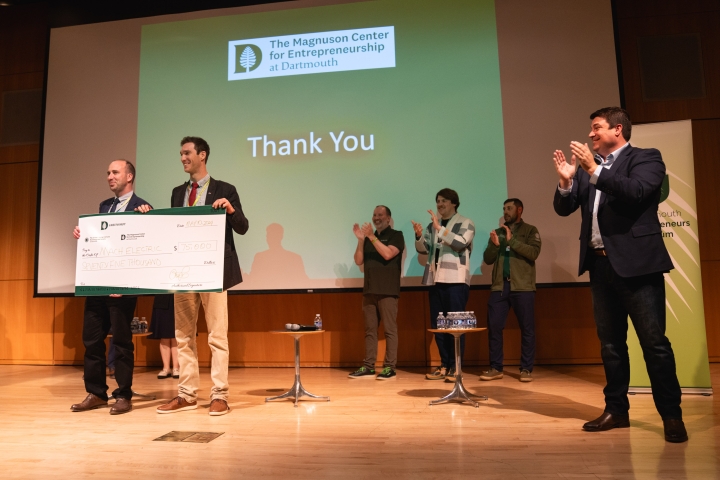Mach Electric, a startup company based in Boulder, Colo., aiming to produce aerospace-grade carbon fiber through a process that sequesters carbon dioxide from often overlooked sources, won $75,000 in a pitch competition Friday in New York City at the Dartmouth Entrepreneurs Forum.
The team was one of nine contenders of sustainably minded entrepreneurs from Dartmouth’s new Greenshot accelerator, launched in January by the Arthur L. Irving Institute for Energy and Society and the Magnuson Center for Entrepreneurship in close partnership with the Tuck School of Business, Thayer School of Engineering, and Cleantech Open Northeast.
Greenshot is designed to assist entrepreneurs with startups focused on climate change. The Mach Electric technology is intended to produce the carbon fibers from industrial waste, including from breweries.
Accepting the award with colleague Wesley Whitaker, Guarini ’12, Mach Electric co-founder Spencer Dansereau said, “I’m very excited to have had the opportunity to work with Greenshot. It’s been absolutely transformative in how we’ve developed as a team and how we’ve developed our technology as we move towards our path to market. The $75,000 is the cherry on top and will make it possible to do some critical de-risking.”
Judges for the contest included Matt McIlwain ’87, managing partner with Madrona, a Seattle-based venture capital firm, and a member of the Magnuson Center’s Board of Advisors. The Magnuson Center was the host of the Entrepreneurs Forum.
“Mach Electric is a young team that’s iteratively learning, and they have a methodology proven in the lab to turn something people think of as waste, coming out of breweries, into something that’s of value to make different kinds of graphite-based products,” said McIlwain. “It’s a really good alignment.”

Prior to Friday’s final presentations at the CUNY Graduate Center, all nine teams presented at Demo Day hosted by Alumni Ventures, a venture capital firm whose board members include Laura Rippy ’89, a Greenshot external adviser, and Errik Anderson ’00, Tuck ’07, a Magnuson Center board of advisor, from which three contenders advanced to the final round. Second place went to Greener, which provides autonomous lawn mowing, monitoring, and management for landscape companies, principally on Long Island, N.Y. and Martha’s Vineyard, Mass.
Rune Aero, which aims to produce autonomous cargo aircraft, won third prize.
The inaugural Greenshot cohort included:
- Block Carbon
Unlocks global market for climate assets - Greener
Sustainable residential landscaping services platform. - Green Golf Carbon
Carbon sequestration for golf courses and managed turf - Mach Electric
Sustainable aviation and materials technologies - NET Offset
Transforming biomass residues into carbon credits - Pacto Medical
Sustainable medical packaging - Rune Aero
Sustainable autonomous aircraft for regional cargo transport - Vybe Energy
AI-assisted and optimized building energy management - Woodwall
Natural wood walls in partnership with regional forests
In a sense, all nine teams were winners, said Liana Frey ’92, Tuck ’98, an Irving Institute senior fellow and Greenshot lead.
“Greenshot has created a Dartmouth community around climate innovation that has involved over 50 climate experts, 30 students, and nine startups working togethers. Demo Day was a unique opportunity to apply what the teams have learned over the course of the last four months, in weekly educational sessions featuring curriculum from Tuck School of Business, CleanTech Open experts, and climate experts from the private sector. With tailor-made advice from mentors and through peer-to-peer sharing sessions, they have all grown tremendously over the program, ” she said. “We look forward to inviting another cohort to work with us next year.”

Geoffrey Parker, the Charles E. Hutchinson 68A Professor of Engineering Innovation, executive director of the Master of Engineering Management Program, and the interim faculty director at the Irving Institute, said Greenshot is integral to the institute’s mission “to accelerate the transition to a low and no-carbon energy future. This is our effort to catalyze activity across campus that wouldn’t otherwise have taken place. We’re like connective tissue that can weave together people from the arts and sciences, critical external stakeholders, and the broader alumni community. And today is an example of the power of that network.”
The Greenshot presentations capped a daylong forum featuring workshops and panel discussions, including a fireside chat with Shonda Rhimes ’91, who, along with Keith Dunleavy ’91, had been inducted into Dartmouth’s Entrepreneurs Hall of Fame, which is overseen by Magnuson, on Thursday night.
“Launching our climate solutions accelerator on campus and then concluding Greenshot at the Dartmouth Entrepreneurs Forum in New York City on Friday was akin to igniting a spark in a dark room,” said Jamie Coughlin, founding executive director of the Magnuson Center. “It not only illuminated the path for our nine teams, providing direction on what they needed to do to move their respective startup ideas forward, but it also inspired a ripple effect for our entrepreneurial community to join us in our work. We’ve initiated a collective sprint towards a sustainable future, where Dartmouth innovation and our entrepreneurial community run tirelessly at the heart of such global issues, and we aren’t slowing down anytime soon.”
